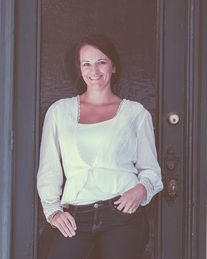

It was Valentine's weekend and we were fresh off our first marriage conference. Twenty four hours of teaching all about communication and commitment and consummation. Our living room was dimly lit as it usually is at the end of the day. The fire was roaring to keep our home warm and our beautiful children were upstairs sleeping soundly . Doesn't that sound like the perfect time to have a big old fight? The biggest fight in the history of us! We don't fight much, (if ever). I'm a very verbal person so when I feel something, he usually knows it! (And if I don't say something I just clean like a silent mad woman and then he usually knows something is wrong). I'm not proud of the way I act when I'm upset. Don't judge, I'm a work in progress!
So on that cozy night the words poured out of my mouth and off my shoulders. They spilled out of my mind and soul, running for their lives....our lives! I didn't even know I felt these things until I started talking about them. And he graciously listened and heard me. He heard what I wished I would have said months before. Words and thoughts about fulfillment and longing and being noticed as more than the Mother of his children.

A wise woman, (and Mother of 10!) shared some words of wisdom on how she and her husband have made a marriage together through the years. "In the cold winter seasons of our marriage, keep reminding yourself that it is only a season and eventually the springtime comes with new life and refreshed love. A much deeper love because we survived the winter. After many years of marriage I have realized the importance of biting my tongue. Better to have a sore tongue that will heal in a week, than a wounded man that may take years. I have learned to place a high value on all the good that we have, instead of devaluing our relationship with discontent and whining."
When we made our vows on that hot September day under a blue cloudless sky, we wanted a teammate, a comrade, a partner, and a pioneer, not just a spouse. We started out as husband and wife, but that's the easy part. Anyone can be married, but not just anyone can have a marriage. But that takes work, stupid, heart-wrenching, annoying work. We work on ourselves and try to work on our spouse, (never successfully). We think about our potential apart from them. We magnify their weaknesses and overrate our strengths. We wonder what it would be like if we'd married that other person instead.
“Aware of our deep failings, we pour contempt on our own hearts for wanting more. Oh, we long for intimacy and for adventure; we long to be the Beauty of some great story. But the desires set deep in our hearts seem like a luxury, granted only to those women who get their acts
together. The message to the rest of us – whether from a driven culture or a driven church – is try harder.” ~Stasi Eldredge, "Captivating"
And try harder we do. We pray and cry and change the way we act for a month or so. We try to be more and do more and say less. We quietly kill our true selves on the altar of a peaceful marriage. My greatest desire is to allow our true selves to be discovered and uncovered, even embraced in all their glorious beauty and ugly rawness. This highway of marriage with all its pot holes and scenic mountaintops, its windows-down and radio up, traffic jams and detours, clogged fuel filters and blown head gaskets. It's a journey that we're on together, we are working out the glitches, together.
Dr. Henry Cloud, a clinical psychologist and best-selling author wrote a beautiful article called "Blocks to Love." I wanted to take a few minutes and share some of his thoughts and insights with you, (most of which can be found at the bottom of this page, after the video). He writes, "in the mere contemplation of love, we are humbled. For who among us could ever claim to have “figured it out?” The mysteries of love and how to make it work baffle even the most well-intentioned. In many contexts, from parenting to marriage, friendship to business relationships, we find that our best efforts often fail and disappointment finds its way into our most valued sphere of life.

Better or worse but what else can we do?
And better or worse I am tethered to you
Cause real love is hard love
It’s all we have.
*All pictures courtesy of Lazio Images
Points to Ponder: Excerpts from "Blocks to Love" by Henry Cloud
Why is this? There are many reasons, but they all come down to a basic
orientation in ourselves towards ourselves. In other words, ever since Adam, we have been basically looking out for number one, and that is the surest way to destroy a relationship. We have a tendency to think of ourselves first instead of the relationship itself. We are trying to get what we want instead of seeing also the needs of others. And as a result of this self-orientation we destroy all chances of getting what we want and need, which in the final analysis is always love.
We will be taking a look at the ways of functioning that prevent love from growing in almost any context. Before we take a look at these traits, one sober word of warning: In looking for the problems in any relationship we are in, we always do well to point the finger back at ourselves. At least as Jesus said, it is a good place to begin to look! There is no doubt that others cause some of the pain and failure of relationships in our lives. But the reality is that we are probably adding to the problem or if we are not, we probably could be doing some things better that would give us a better chance of working it out, even if you find yourself in a relationship with a “problem person.” Sometimes, the most immature people can grow when in the presence of an integrating relationship. So, in looking at some of the dynamics of what the blocks are to good relationships, keep yourself in mind. The more that you can take ownership of these tendencies in yourself, the more likely you are to make relationships work and to pick people who are able to make them work as well. Mature people tend to pick mature people. Now, join me in a look at the things that poison love.
The Love Killers-Poisons To Avoid
Self-centeredness or Ego-centricity
Many people think of selfish people as being difficult. But “self-centeredness” comes closer to the real description of what a truly selfish
person is. What it means is that someone basically experiences life mostly in terms of him or herself.
When one is self-centered, he guarantees the failure of love, for love is an
attachment between two people, and the self-centered person denies the reality of the “other.” He only sees others as extensions of himself. They exist to make him happy. Love requires two people, not one person and an “object.”
Lack of Observing Oneself
Psalm 36 says the following: “For in his own eyes he flatters himself too
much to detect or hate his sin.” And 1 John says the same thing in another way: “If we claim to be without sin, we deceive ourselves and the truth is not in us.”
The idea is this and is one of the most frustrating qualities that anyone can have in a relationship: The inability to see one’s own behavior,
especially when one is wrong.
No relationship or person is perfect. And we can work out any kind of
conflict with anyone as long as the two people involved are able and willing to look at their own behavior and own it. The act of ownership of our wrongs makes moving past the conflict and getting to a deeper connection possible, and when someone cannot see their wrong, the relationship gets stuck.
This is why God is so into our confession. It lets us get to a better place. Let yourself always look first to yourself in any conflict to see where you might be wrong. That will enable you to see the truth of the situation more clearly. (Matt. 7:3-5)
Inability to Validate Another’s Experience
Being understood is one of our deepest needs. We don’t really need to know that we are “right,” as much as we need to know that someone understands how we feel and what our “reality” is.
Proverbs 18:13 says, “He who answers before listening– that is his folly and his shame.” We need to be listened to and understood, not quickly negated for how we feel and what we think. Research has shown that some of the most serious emotional disorders come from having ones
emotions misunderstood. On the other hand, when someone says something that shows their understanding, we are more open to input about our reality.
Play Fair
This one sounds weird, for it seems that playing fair would be a good thing. The problem is that fair is what the Bible calls “the Law.” In other words, it means returning an “eye for an eye, and a tooth for a tooth.” It means that we treat others as they treat us. If they are kind, then we are kind. If they hurt us, then we hurt them back. If they are immature, then we are immature as well. Listen to what Jesus says, “If you love those who love you, what credit is that to you? Even ‘sinners’ love those who love them. And if you do good to those who are good to you, what credit is that to you? Even ‘sinners’ do that.” (Luke 6:32,33) It is easy for us to be good to those who earn it. The problem is that no one earns it all the time, and every relationship has problem behavior. This is why simple “fairness” cannot work, for then the worst behavior in the relationship becomes the common denominator.
To transcend a pattern in a relationship, we cannot play fair and return evil for evil. (Rom.12:17) The only way for any relationship to overcome our imperfections is for the receiving party to be “bigger than that,” and return grace and truth instead of the injury.
Emotional Detachment
“The lights are on but nobody is home.” To be emotionally detached is to be out of touch with one’s feelings and unable to be emotionally present in a relationship. It can be a killer to intimacy, because it feels to the other
party that they are alone, even though someone is there. The Bible says that to love God involves the heart as well as the mind. When we are out of touch with our feelings and cannot express them to one another, then intimacy is blocked, and our experience is one of the person’s heart being
“far away.”
To feel close, we need to be present emotionally. Our needs, vulnerabilities, fears, pain, tender feelings, and the like must be
communicated and expressed. Intimacy involves the heart, as well as the
mind. As David said, God desires truth in the “innermost being.” (Ps. 51:6) If someone is out of touch with their deep feelings and innermost parts, then shallow relationships are what follows.
Control and Denial of Separateness
Paul tells us that freedom is so important, that Jesus died for it. (Gal.
5:1) We are not to be under any kind of slavery ever again. But the reality is that many people do not honor freedom in their relationships. They do not see the other person as a free person from them, able to make their own decisions and have their own desires. Instead, they see the other as an extension of themselves, and have strong attempts to control the freedom of the one they “love.”
Love can only exist where there is freedom. Our attempts to control what
another person thinks, feels, wants, does, values, believes, etc. are destined to drive them away, and ultimately destroy love. Love only exists as we see another person in their own right as a separate individual, who as Jesus said is free to do what they want to with
what is their own. (see Matt. 20:15)
Wish For Eden
There was a time when everything was perfect. It was called paradise, and the Bible refers to it as the Garden of Eden. In that place, everything was “good.” But, as the rest of the Bible tells us, and history confirms, Eden has been lost, and we live in an imperfect world. What that translates to in the world of relationships is that we will always be in relationships with people who have imperfections.
To the extent that someone has come to grip with this reality, they have
satisfactory relationships. They can accept others for who they are and solve problems. But if they still have a wish to be in the Garden where things are perfect, they are always frustrated with the people they find themselves connected to. They always want more, they judge and
protest the reality of who the person is and there is very little safety
for love to grow.
Narcissism and perfectionism are killers to real relationship. Real love can only grow where someone’s “real self” can be known and accepted by the other person. If there are demands for perfection and the “ideal person,” then love is blocked.
“I Know Better” and other “Parental Dynamics”
Adults who are in significant relationships are meant to be equals and share the reality of who they are in a spirit of mutuality. Some people, however, want not to be equals, but one-up on the other person. They want to be in more of a parent-child type of connection where they are in charge. They have expectations for the other to be in subjection to them in some strange way, and are dominating in their style.
This type of “I know better” stance blocks love in a horrible way, as the
person who is “under” feels belittled, controlled, dominated and disrespected. In the best scenario’s, the so-called “benevolent dictator,” the one on the bottom rung fails to grow up and develop into who they were meant to be.
Typical of this type of stance are a lot of “you should’s,” that dominate the
person’s thinking, as they freely tell the other person how to think, live, be
and what to do. The biggest problems to love in this type of connection come from the resentment in the one-down person, and their drive to become independent from the dominating one.
Lack of Boundaries
The last block to love that we will consider is the lack of boundaries.
When we have these kinds of disturbances, we either allow people to walk all over us in a way that destroys respect, or we walk all over them and “trespass” against them, destroying love in the process. True love
respects each other’s boundaries, saying “no” when we need to, and
respecting it when we hear it.
Another aspect of boundaries has to do with requiring responsible behavior from each other in a relationship and taking a stance against evil when it occurs. True love cannot grow when evil is allowed to triumph.
Love is not an easy thing to accomplish in this life. In fact, it is so
difficult because of our particular inclinations to do the very things we just talked about. There is a part of all of us that tends to try to please ourselves instead of accomplish love, and in the process we lose the love that we wanted in the first place. Remember, love does not “just happen.” It takes work.

